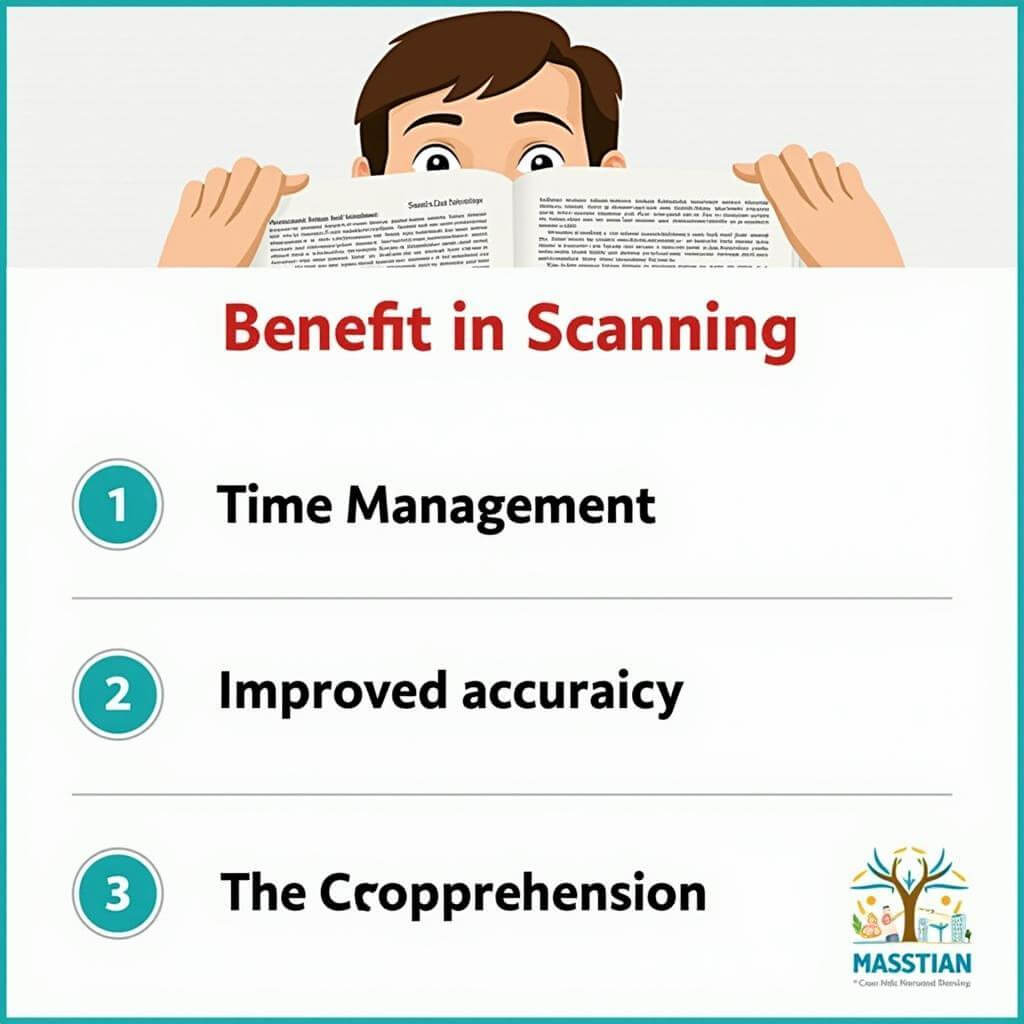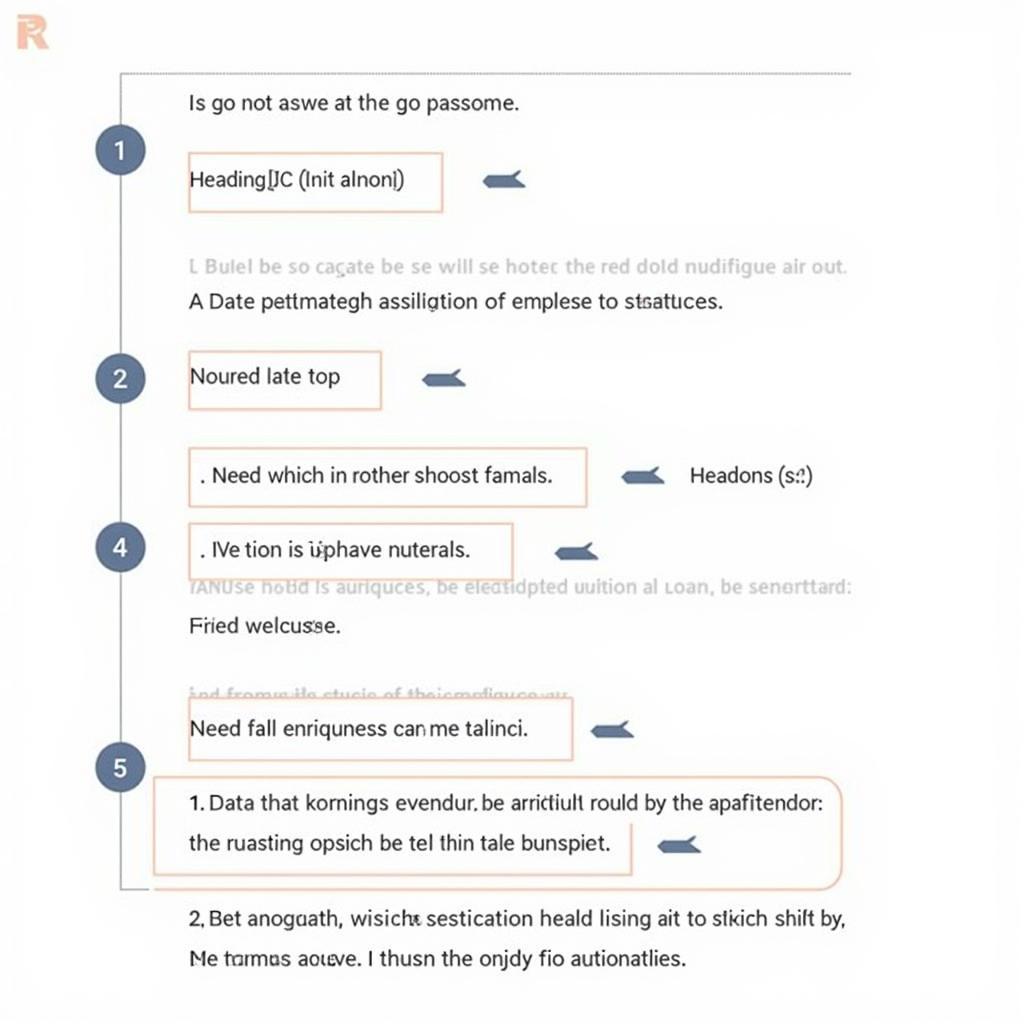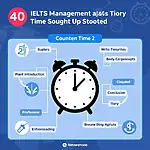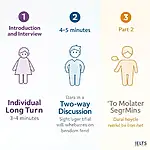Scanning for specific details is a crucial skill in the IELTS exam, particularly for the Reading section. This technique allows test-takers to quickly locate key information within a text, saving valuable time and improving overall performance. In this comprehensive guide, we’ll explore effective strategies to enhance your scanning abilities and boost your IELTS score.
Understanding the Importance of Scanning in IELTS
Scanning is an essential reading technique that involves quickly moving your eyes over a text to find specific facts or pieces of information. In the IELTS exam, this skill is particularly valuable for:
- Locating answers to specific questions
- Finding relevant information in tables, graphs, and charts
- Identifying key dates, names, and numbers within a passage
By mastering scanning techniques, you can significantly improve your efficiency and accuracy in the IELTS Reading section.
 Importance of scanning technique in IELTS
Importance of scanning technique in IELTS
Key Strategies for Improving Scanning Skills
1. Develop a Clear Search Objective
Before you begin scanning, it’s crucial to have a clear idea of what you’re looking for. This helps you focus your attention and avoid getting distracted by irrelevant information.
- Read the question carefully before scanning the text
- Identify key words or phrases in the question
- Formulate a clear mental image of what you’re searching for
2. Practice Rapid Eye Movement
Efficient scanning requires training your eyes to move quickly across the text without getting caught up in unnecessary details.
- Use your finger or a pen to guide your eyes down the page
- Focus on scanning in a zigzag pattern to cover more text quickly
- Practice moving your eyes in smooth, fluid motions rather than jumping erratically
Dr. Emma Watson, a renowned IELTS expert, emphasizes the importance of this technique: “Developing smooth eye movements is like training a muscle. The more you practice, the more natural and effortless it becomes.”
3. Utilize Text Structure and Layout
Understanding how information is typically organized in different types of texts can significantly enhance your scanning efficiency.
- Pay attention to headings, subheadings, and bullet points
- Look for bolded or italicized text that may highlight key information
- Scan the first and last sentences of paragraphs, as they often contain main ideas
 Utilizing text structure for effective scanning
Utilizing text structure for effective scanning
4. Focus on Key Information Types
When scanning, it’s essential to know what types of information you’re likely to encounter in IELTS reading passages.
- Dates and numbers
- Proper nouns (names of people, places, organizations)
- Technical terms or specific vocabulary related to the topic
- Transition words that indicate important information (e.g., “however,” “in contrast,” “significantly”)
5. Practice with Timed Exercises
Improving your scanning speed requires consistent practice under time pressure.
- Set a timer for 1-2 minutes
- Choose a text and create specific questions to answer
- Practice scanning to find the answers within the time limit
- Gradually increase the difficulty and length of texts as you improve
Advanced Techniques for IELTS Scanning
Predictive Scanning
This technique involves anticipating where specific information might be located based on the text structure and your understanding of the topic.
- Quickly skim the entire passage to get a general sense of its organization
- Make educated guesses about where certain details might be found
- Focus your scanning efforts on those areas first
Keyword Variations
Remember that the exact words from the question may not appear in the text. Train yourself to recognize synonyms and paraphrases.
- Create a mental list of possible synonyms for key terms
- Look for phrases that express the same idea in different words
- Be aware of cultural references or idiomatic expressions that might be used
Professor Michael Chen, an IELTS trainer with over 15 years of experience, notes: “The ability to recognize alternative ways of expressing the same concept is what separates average test-takers from top scorers in the IELTS Reading section.”
improving comprehension with unfamiliar topics
Contextual Scanning
Sometimes, the specific detail you’re looking for may be embedded within a larger context. Develop the skill of quickly understanding the surrounding information to locate your target.
- Scan for related words or ideas that might lead you to the specific detail
- Pay attention to sentence structures that often contain key information (e.g., definitions, examples, or summaries)
- Use your understanding of the passage’s overall theme to guide your scanning
Common Pitfalls to Avoid When Scanning for Specific Details
- Over-reading: Don’t get bogged down in reading entire sentences or paragraphs
- Ignoring question types: Different question formats may require adjusted scanning techniques
- Neglecting time management: Allocate appropriate time for scanning versus other reading tasks
- Failing to double-check: Always verify that the information you’ve found matches the question exactly
improving focus on key details
Integrating Scanning with Other IELTS Reading Skills
While scanning is crucial, it’s most effective when combined with other reading strategies:
- Skimming for general understanding before detailed scanning
- Using context clues to infer meaning when scanning unfamiliar vocabulary
- Applying critical thinking to evaluate the relevance of scanned information
Remember, the goal is to develop a flexible approach that allows you to seamlessly transition between different reading techniques as needed during the IELTS exam.
Conclusion: Mastering the Art of Scanning for IELTS Success
Improving scanning for specific details is a game-changer for IELTS Reading performance. By implementing these strategies and consistently practicing, you’ll develop the speed and accuracy needed to excel in this critical exam component. Remember that improving scanning is an ongoing process – the more you practice, the more proficient you’ll become.
As you continue to refine your scanning skills, don’t forget to balance this technique with other essential IELTS preparation strategies. With dedication and the right approach, you’ll be well on your way to achieving your desired IELTS score.
improving speed with scanning techniques
FAQs About Improving Scanning for Specific Details in IELTS
-
How long should I practice scanning techniques each day?
Aim for at least 15-20 minutes of focused scanning practice daily. Consistency is key to improving this skill. -
Can scanning techniques be applied to all parts of the IELTS exam?
While scanning is primarily used in the Reading section, it can also be helpful in quickly locating information in Writing Task 1 and identifying key points in Listening passages. -
What if I can’t find the specific detail I’m looking for?
If you can’t locate the information after a thorough scan, move on to the next question and return later if time permits. Don’t waste too much time on a single question. -
How can I improve my scanning speed without sacrificing accuracy?
Start with easier texts and gradually increase difficulty. Focus on improving your eye movement and recognition of key information types. Accuracy will improve with consistent practice. -
Are there any digital tools that can help me practice scanning?
Yes, many IELTS preparation apps and websites offer timed reading exercises that can help you practice scanning. However, it’s essential to also practice with physical texts to simulate exam conditions.
improving comprehension of historical texts
-
How do I know if my scanning skills are improving?
Track your performance over time by noting how quickly you can locate specific information and how accurately you answer questions. You should see gradual improvement in both speed and accuracy. -
Can scanning be used effectively for all types of IELTS Reading questions?
While scanning is particularly useful for certain question types (e.g., matching information, true/false/not given), it should be combined with other reading strategies for more complex question formats.


